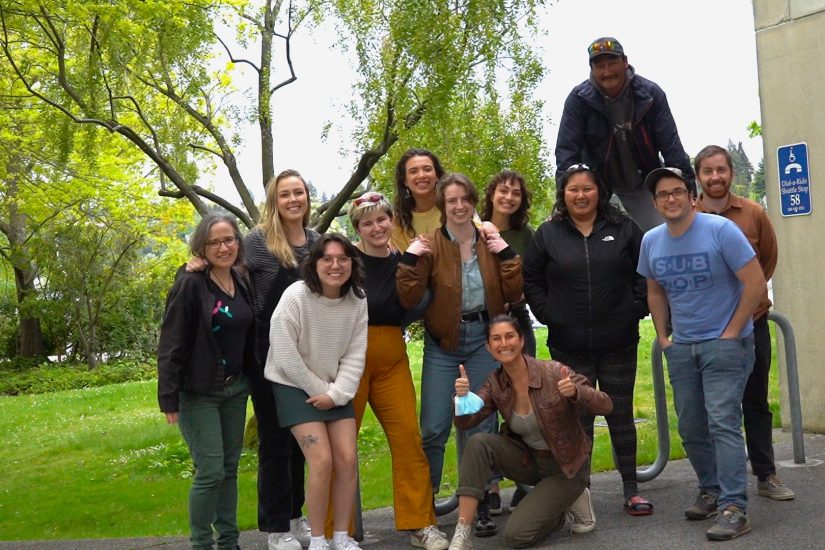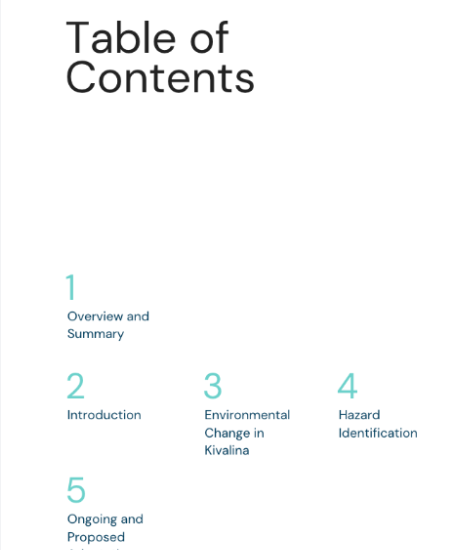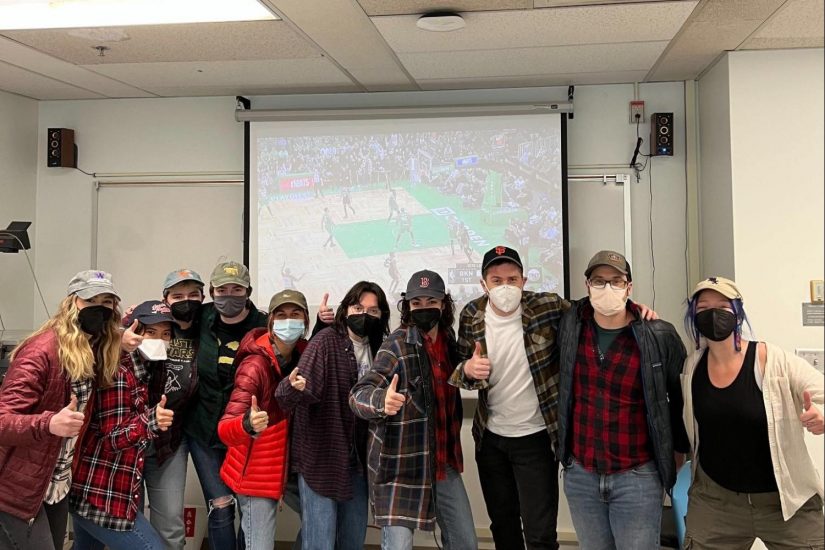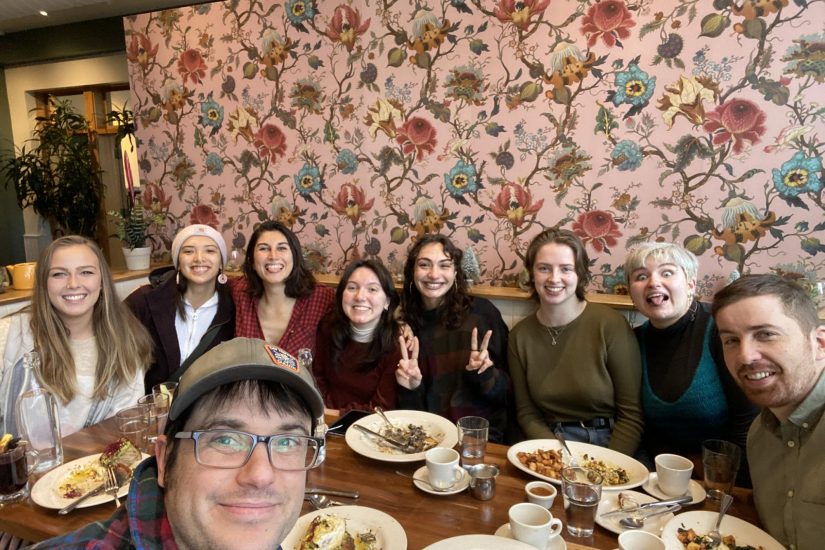Reflections on Knowledge Sharing to Build Community
As we write this article, only a month remains until our graduation from the School of Marine and Environmental Affairs (SMEA) Master’s program. It is starting to feel like there is a light at the end of the tunnel – one of us gets to finally not be a student for the first time ever, and the other gets to continue building on the momentum cultivated while at SMEA by beginning a PhD program. Before that, we both get to travel to Kivalina, Alaska with our capstone group to spend a week living with folks in the Arctic who we’ve only ever interacted with via Zoom (until recently!).
This trip represents the culmination of two years of work and relationship-building amongst over a dozen collaborators in both Seattle and Kivalina. Over the length of our involvement, we’ve experienced graduate school both virtually and in-person, worked countless hours on our capstone project, and spent invaluable time learning with colleagues in Kivalina who have also become friends. Despite 2,000 miles of physical distance, we’ve been able to leverage technology to work on a co-produced, community-based research project. Our project has focused on topics from how the community’s Search and Rescue organization is supporting climate adaptation, to the design and implementation of a land-based science curriculum, and using social media to enhance the exchange of sea-ice observations and forecasting. None of this work would have been possible without the community we built within our academic capstone group at SMEA, or the relationships we’ve grown with our friends and collaborators in Kivalina. We have chosen to write this article as an ode to the immense value of community building through knowledge sharing, in all its forms, in an effort to reflect upon what the process has meant to us and to some of our fellow near-graduates.

Our two year graduate program has felt much longer, especially when more than half has been strictly over Zoom. The number one question going through many of our minds when we began the program was, “How the hell am I going to make friends?!” Initiating friendships is hard enough, and building community is even harder. Community building is often not a priority in the hierarchical and often transactional society we live in as both students at a Western university and, personally, as descendants of settlers to the continental U.S.. But perhaps one of the most important things we learned from the COVID-19 pandemic is that we need community, mutual support, and relationships to sustain us.
We quickly came to realize that the true value of exchanging knowledge with our Kivalina collaborators lies not in the formal write-ups we produce for the university as part of our degree requirements, but in the transformation of our relationships from acquaintances at work, to friends that we laugh and dream with – even across a great physical distance.
After joining the Polar Science at a Human Scale capstone with Dr. P. Joshua Griffin, who we affectionately call Griff, we began to appreciate the incredible value of knowledge sharing as a way to foster community, particularly as it extends beyond conventional approaches to academic research. Griff has worked with folks in Kivalina for a decade and welcomed us to the project he co-directs with Colleen Swan and Reppi Swan Sr., of Kivalina Search and Rescue. Among the highlights of this work was a micro-seminar last spring, which featured a rotation of polar scientists in conversation with participants from Kivalina on place-based topics from oceanography to caribou to marine mammals. Through this seminar and our many conversations with Colleen and Reppi over the past two years, we’ve cultivated stronger relationships grounded in respect and understanding for each other. We quickly came to realize that the true value of exchanging knowledge with our Kivalina collaborators lies not in the formal write-ups we produce for the university as part of our degree requirements, but in the transformation of our relationships from acquaintances at work, to friends that we laugh and dream with – even across a great physical distance.
Our advisor Griff summarizes this experience eloquently: “Knowing and doing… you’re always in a continual reciprocal relationship. The whole notion of engaged ethnography, quite simply, is a methodology that tries to understand diverse situations, whether social or ecological, by participating through actual relationships with people within those situations. It doesn’t require the sort of profound othering between you as the one who’s learning and the people that you’re learning from and with.”

Knowledge sharing has the potential to build community through an interconnected web of relationships, each holding value and respect. For us, knowledge sharing can range from rich conversations in class discussion, formal interviews, or from time spent in more informal, everyday settings. One thing these interactions have in common is that they are based in relationality and respect rather than transaction. Oftentimes in higher education, academics take part in “helicopter research” where projects are grounded in one-sided academic gain and often fail to view those outside of the institution as worthy of time, inclusion, credibility, or respect. Parallel with this is the common view that the Western form of knowing is the objective pinnacle of truth, whereas forms of knowing that fall outside of this are often deemed secondary or less legitimate. Experiences like on-the-job learning, traditional and cultural knowledge, and lived experiences cultivate rich knowledge, but tend to be taken less seriously than the products of Western research. However, our team has learned to appreciate the value of community-based relationships and collective knowledge sharing rather than transactional extraction for individual benefit.
Through this process, we’ve also strengthened our community here in Seattle. While our unusually large capstone group has spent each week working on different facets of our project (we have sub-groups focused on digital storytelling, curriculum development, strategic planning, and sea ice observations), each of our efforts are entwined. The interconnected nature of our project relies on knowledge sharing as its bedrock – sometimes this takes place within a classroom workspace, but sometimes it takes place during a group dinner at someone’s house, at a bonfire, or over drinks at a bar. In fact, most of our best ideas and breakthroughs have come at times of casual conversation in between designated working hours. Each of these moments has value within the community we’ve built, as we give each other the space to contribute not only information and research, but also lived experiences and unique personal perspectives. These forms of care are invaluable to our project goal of supporting Kivalina’s priorities and initiatives. In strengthening our relationships with one another, we reinforce the usefulness of what we create together through our work.

Beyond our capstone project, the Engaged Ethnography Lab (EEL) has also created these forms of mutual aid through knowledge sharing. EEL members work on a range of capstone or thesis projects, but we are united in our consideration of alternative ways of knowing, learning, and teaching. Whether through community-engaged research with a foundation in love, or learning through peers or family, we have learned the value of knowledge sharing outside the Western traditional framework of education. Engaging with learning on a localized and personal scale not only helps both groups learn and grow, but also can build trust and reciprocal relationships that can last a lifetime.
EEL member Kurt Ellison, has a background as a merchant mariner and is writing a thesis on opportunities for labor justice within the emerging offshore wind energy sector. He discusses the importance of rethinking the kinds of knowledge production so common in the academy. He recognizes a need to move beyond transactional forms of teaching/learning and towards more hands-on teaching based on mutual engagement between the “teachers” and “students” and allows both groups to build relationships with each other.
“My experience is doing hands-on teaching with students in a non-school setting, and also on-the-job training. There are a lot of parallels between them because you’re forming a different type of community and changing people’s relationships with the material. In those settings, knowledge isn’t just coming from us as the ‘educators.’ There’s a tremendous amount of knowledge sharing, skill sharing, and intergenerational sharing going on in that space that I don’t necessarily always see in other – particularly institutional – places. There is no written record of a lot of maritime knowledge; it’s an oral history. I couldn’t point you to a book that tells you most of the things I’ve done on a boat because it doesn’t exist. The only way to learn those things is to share knowledge on the job or intergenerationally in the community.”
-Kurt Ellison

Building solidarity with one another through knowledge sharing and care is vital to both individual and community wellbeing under the current social conditions we live under. Because Western, capitalist societies often prioritize individual wellbeing and success, it becomes more important than ever to build community and strengthen relationships to foster love, support, and healing. In the context of the rigorous academic setting of higher education, having healthy and strong relationships with community is invaluable for one’s own sanity, and also for maintaining integrity within one’s work. Grounded in knowledge sharing, co-production, and respect, rather than transaction, our capstone work has shaped us both as researchers and people, in the same profound ways. As we finish up our time as master’s students, we wish to share our gratitude for the lessons we’ve learned and for the people we’ve learned them from. The greatest gift from our time at SMEA has not been our relationships as research partners: it has been our relationships as friends.